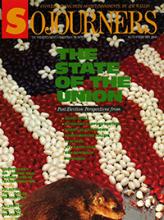THE AMERICAN PEOPLE HAVE just completed a 10 month, multimillion-dollar process of electing a new president of the United States in which 25 percent of the citizens chose between two mediocre personalities, neither of whom addressed in any truthful way the vital issues facing the country and the world in the last 12 years of the 20th century. In this time the world is endangered by global pollution, mass starvation, and the threat of annihilation by nuclear war.
The presidential campaign revealed the terminal stage of a takeover of the political process by image manipulators, directed at television media. This creates distortion and demagoguery and leads to confusion, apathy, and low voter participation. The way our political system selects political candidates is in serious need of reform, if we are to preserve a vital democracy. We need to consider alternative processes that can generate better candidates and greater citizen education and participation.
Most Americans believe that we are the leading democracy in the world. Our government claims the right to intervene in socialist countries such as Cuba and Nicaragua because they are "undemocratic." Yet one of the things that I learned on a visit to Cuba a few years ago is that, at least in some areas, they had developed better grassroots participation in the political process than we have. This was shown in the way in which the Cuban political system creates what are called "basic laws," or policy guides for social development.
Read the Full Article

